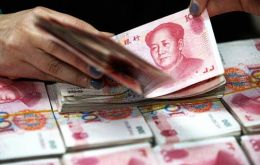MercoPress. South Atlantic News Agency
Tag: China inflation
-
Tuesday, August 9th 2016 - 08:51 UTC
China's foreign trade further declines in July: imports down by 12.5%

Chinese exports have seen a further decline in July, adding to concerns over the global economic outlook. Exports fell by 4.4% compared to a year earlier, which was a slight improvement over June's 4.8% drop but still worse than analysts had been expecting. And imports were also weaker than estimated, down by 12.5%.
-
Thursday, August 27th 2015 - 04:28 UTC
Wall Street rebounds 4%, but European markets still fearful of China

Shares on Wall Street finished with their biggest rise in four years ending another rocky day of trading on global markets. The mood was lifted by comments from US Federal Reserve official William Dudley that a rate rise in September seemed “less compelling”.
-
Monday, August 24th 2015 - 09:56 UTC
Chinese shares fall sharply on Monday; IMF says it's a “necessary adjustment”

Chinese shares continued their sharp fall on Monday as concerns over the country's slowing growth and volatile markets sparked panic among traders. The mainland benchmark index, the Shanghai Composite, fell sharply by 8.4% to 3,211.75 points, extending last week's losses.
-
Friday, August 14th 2015 - 09:58 UTC
China and Asian markets begin to react to new Yuan daily rate-fix policy

Chinese shares rose on Friday as the central bank set the reference rate for the Yuan slightly stronger. The bank set the rate at 6.3975 per dollar compared to Thursday's close of 6.3982.
-
Wednesday, August 12th 2015 - 07:51 UTC
Wednesday’s China shockwave: Yuan devalued 1.6%; IMF support, US Treasury cautious

Chinese shares were lower on Wednesday as its central bank again devalued the yuan, following Tuesday's record cut. The People's Bank of China fixed the daily guiding rate for the currency down 1.6% to 6.3306 against the dollar.
-
Monday, May 11th 2015 - 10:08 UTC
China's cuts interest rates to reduce cost of borrowing and boost the economy

China's central bank announced Sunday it would cut interest rates by 25 basis points as authorities seek to boost the flagging economy following a raft of data indicating a slowdown. The benchmark one-year lending rate would be reduced to 5.1% and the deposit rate to 2.25% from Monday, the People's Bank of China (PBoC) said on its website.
-
Wednesday, December 3rd 2014 - 08:32 UTC
China's factory activity falls faster than expected as the economy keeps cooling

China's factory activity slowed by more than expected in November, highlighting how a cooling economy is impacting its vast manufacturing sector. The official purchasing managers' index (PMI) dipped to 50.3 in November from October's 50.8, closer to the 50 point mark that separates growth from contraction. It was below the 50.6 level expected by economists.
-
Saturday, February 15th 2014 - 05:54 UTC
Despite New Year celebration, China's January inflation remained steady at 2.5%

China's inflation rate remained subdued in January, despite rising food prices during the New Year celebrations. Consumer prices held steady at 2.5% from a year earlier, which was slightly higher than many economists expected.
-
Tuesday, July 16th 2013 - 03:58 UTC
China confirms economy is slowing down after second quarter weaker expansion

China's economic growth slowed in the April to June period, the second straight quarter of weaker expansion. The world's second biggest economy grew by 7.5% compared to the previous year, down from 7.7% in the January to March period, data showed. The figures were in line with analyst expectations.
-
Thursday, July 11th 2013 - 06:34 UTC
China’s June fall in exports and imports anticipate grim outlook for world trade

China has warned of a grim outlook for trade as the world's second-largest economy surprised financial markets by reporting a fall in exports and imports when both had been expected to rise. The June data showed that exports fell 3.1% from a year earlier and imports dropped 0.7%, according to customs officials.
